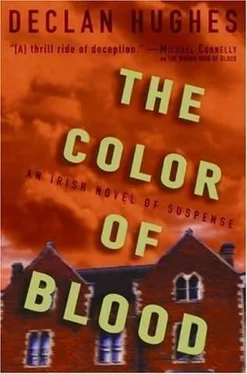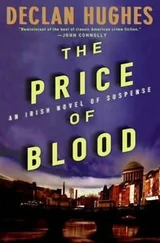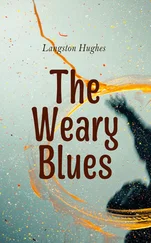After a while, she stood up and opened a door and light bled through to the landing.
“We’re getting closer to a bed,” she said.
I followed her into a bedroom with two arched sash windows that looked out over the three towers to the city beyond; between them stood a mahogany tallboy with a tray of booze on top; against the wall facing, the bed was brass-framed; I left my clothes on a chair and joined Sandra there. She had smears of blood on her lips; she brought her hand up to mine to show me I had too. There were weals on her hips, right and left.
“How did you get those?” I said.
“Your wedding ring,” she said. “How long were you married? You don’t have to answer.”
“Not long enough. Or too long. Isn’t that how it goes?”
“I don’t know. I think it goes differently for each person.”
“Are you still married?”
“Not really. Not in any of the ways that count. But I probably won’t divorce Denis. He’s worked hard for us all.”
I lay there for a while and thought about my wife, married to another man and about to give birth to his child, and about our child, dead and buried in the ocean, about the anger I couldn’t seem to shake and the way it expressed itself, in lust for a woman who could be a murderer, my balls hardening again as Sandra rubbed a nipple against mine and held my cock firm in her pale hand.
“We need to talk,” I said.
“We need more than talk,” she said, and we took more from each other, took what we needed, or tried. Afterward, I stood and looked out over the three great towers and the city beyond, and thought how like a king it must feel to have this view at your command, how a castle would be nothing more than your due. When I turned back, Sandra had pulled the white cover up to her neck, and there were tears in her eyes.
“If we need to talk, you’d better start,” she said. “Tell me what you’ve found out and what you think it might mean.”
“I don’t know what any of it means yet,” I said. “Maybe you can tell me.”
I thought about getting dressed, and then I thought, If I do, Sandra is less likely to trust me, to keep her guard down. So I got back into bed beside her, and as I propped up some pillows to sit against and pressed a smile onto my face, I felt in need of a drink to cleanse the shame of what I’d just thought from my mind; no wonder my wife had been drifting away long before our child died; how could you live with, let alone love, someone whose every thought was double, whose cast of mind was all manipulation, calculation, whose deepest urge was not to live life, to experience moments, but to analyze them and connect them up until they reached a statement, a verdict, an indictment?
As if she could read my thoughts, or maybe because she shared some of them, Sandra rose from the bed and pulled her green silk wrapper on and got brandy and San Pellegrino and glasses from the tallboy and brought them back to bed and made drinks and gave me one and grinned, her mascara smeared and her lips the color of blood, high above Dublin with the brandy warming us.
I could live with this woman until the end of time, I thought, and felt it was true, and then laughed at it, or made myself laugh at it, as if it was one of those things you think on holiday, drunk: “Why don’t I drop out of the rat race, move to this island and live off the land?” But I felt it, and I thought it was true. And then I opened my mouth.
“You and Denis Finnegan and Richard O’Connor were all at Castlehill College around the same time, in the 1980s. I suppose you must have been involved with hiring Denis, as deputy headmistress.”
Sandra laughed.
“No, not really, there was a panel to discuss appointments, but it was the principal’s call. And the board ratify that. No, all a vice principal-that’s what they were called even in the eighties, I think the only deputy headmistresses they have now are in dungeons with handcuffs and whips-all I did was, well, I’m not sure what I did, filled in gaps and held the fort, I suppose. Responsibility without power, the wrong way round. Made my mother very happy though.”
“And your father? Your father was still alive then?”
“He was dismayed neither of us was doing medicine.”
“What about dentistry?”
“Father thought you might as well be an anesthetist, or a nurse, as a dentist.”
“It was a big step for a school like Castlehill, with its very burly rugby atmosphere, to appoint a woman to a top job.”
“That’s why they did it. So people would see they had done it, and then they could just continue on the way they were. Most appointments had something to do with rugby, Denis’s included. I was the exception that proved the rule. And of course, given who my brother was, I wasn’t even an exception.”
“And did you know Dr. O’Connor well? He just came in to lend a hand coaching, didn’t he? Did you get involved at that level?”
Sandra shook her head.
“I’ve never really cared for the game. Never attracted to the boys who played it. And the cult of it in school…the mother, in her fur coat, presenting the winning captain, her son, with the cup…it’s like something from the Colosseum.”
“Not even when Jonathan showed signs of being a player?”
“That was different. That was because of how well it meant he and his father were getting on.”
“So did you know Dr. O’Connor well, rugby aside?”
“When?”
“In the early eighties. In the years before his wife was murdered.”
“Did I know him…well…you mean, as more than a colleague? As a friend? As a lover?”
“Any of the above. And Denis Finnegan. How well did you know him?”
“In the period before Audrey Howard was murdered.”
“That’s right. Same categories.”
Sandra drank her brandy down and pulled her wrapper across her breasts and cupped the bloodstone in her hand; I could see it flash green and red, like a barometer of the energy between us.
“In the early eighties, I spent most of the time either working or looking after my elderly parents, that is to say, nursing Father through his long final illness and keeping Mother, or my fucking mother as I exclusively thought of her back then, from alternately driving him mad, firing his nurses, taking an overdose herself, selling the house from underneath us or otherwise trying to steal the limelight. Tramping up and down that stairs at all hours, because you could be sure if he had a fever, she’d develop one too, and God forbid she should sleep in a room on the ground floor. ‘I couldn’t sleep knowing your father was suffering so close to me,’ so I was the one who went without sleep. I wore navy suits and had permed hair and looked older in my twenties than I do now. I didn’t have a boyfriend, didn’t have time or energy for a boyfriend, and if I had, I wouldn’t have chosen Denis or Rock; they were too old, and I still thought I was young, even if I wasn’t getting a chance to live as if I was.”
“What did your father die of?”
“Cancer. Well, pneumonia got him at the last, but it was cancer that had weakened him, lung at first, then it spread into the lymphs. He smoked a hundred a day for years, and cigars, and a pipe. There are still rooms in the house, even repainted, sit for ten minutes and they reek of smoke.”
“You were close, you and he.”
Sandra looked at me, her eyes clear and bright now, and nodded gravely.
“He was a great man. And funny, charming, attractive, clever, arrogant maybe, a little imperious, his way or the highway, but great men have their foibles, shouldn’t they be allowed them? And that’s what he was, a great man.”
“And he died in ’85, isn’t that right?”
“In March. And Audrey O’Connor was murdered in August 1985. So did I start a relationship with Denis or Rock during that period is your next question. No, I did not.”
Читать дальше










